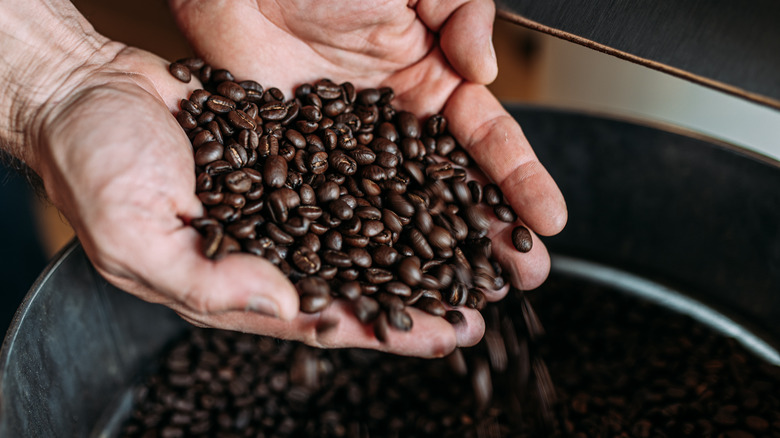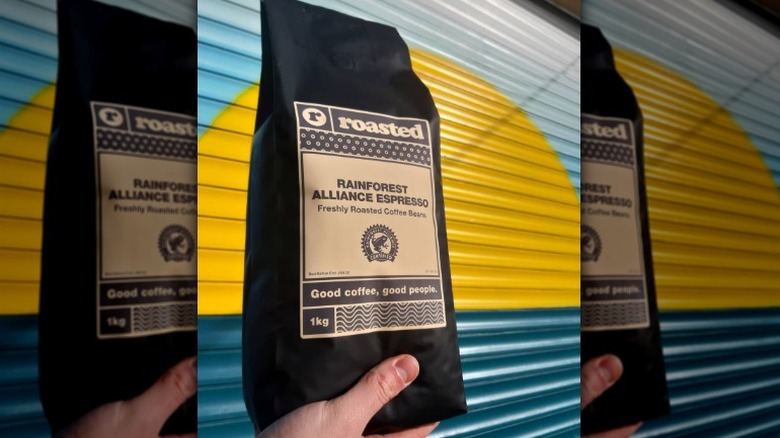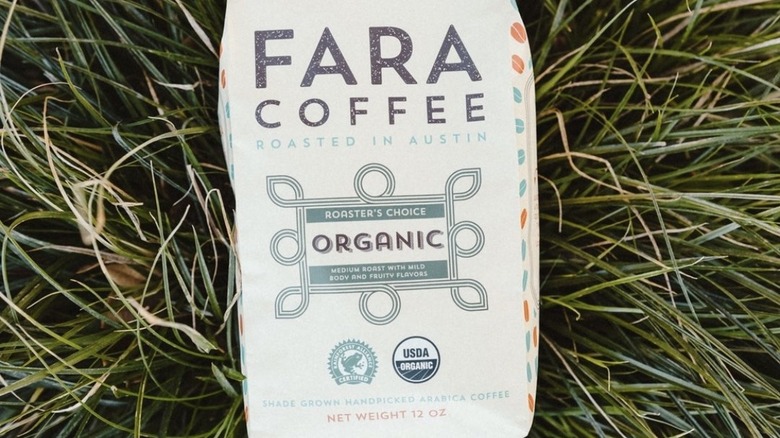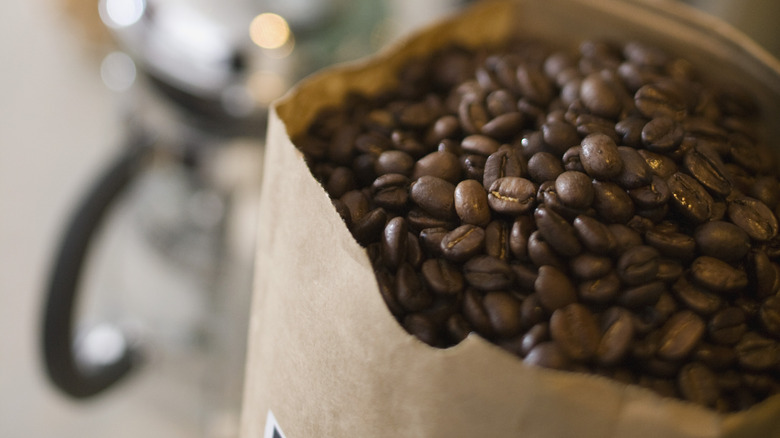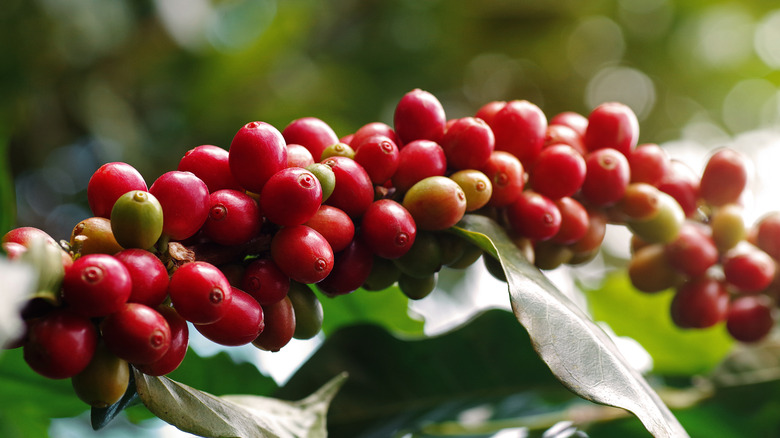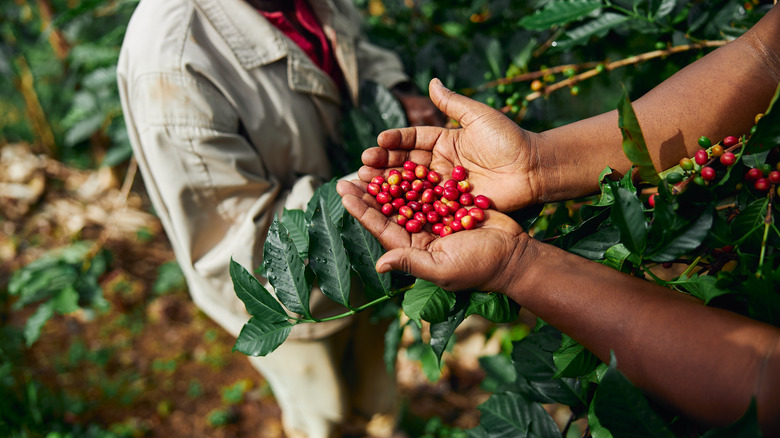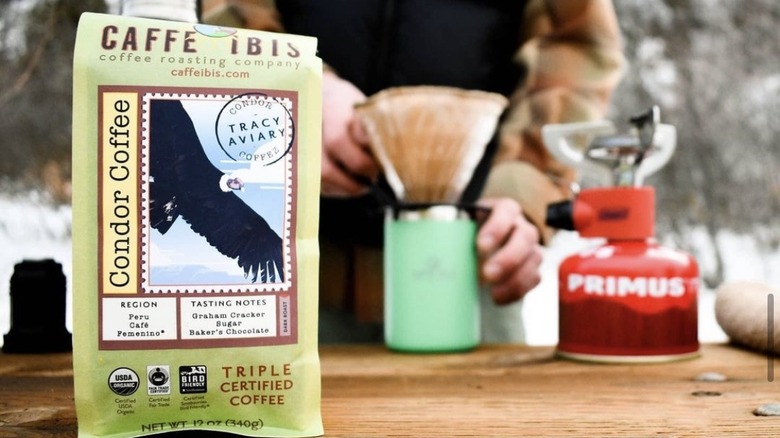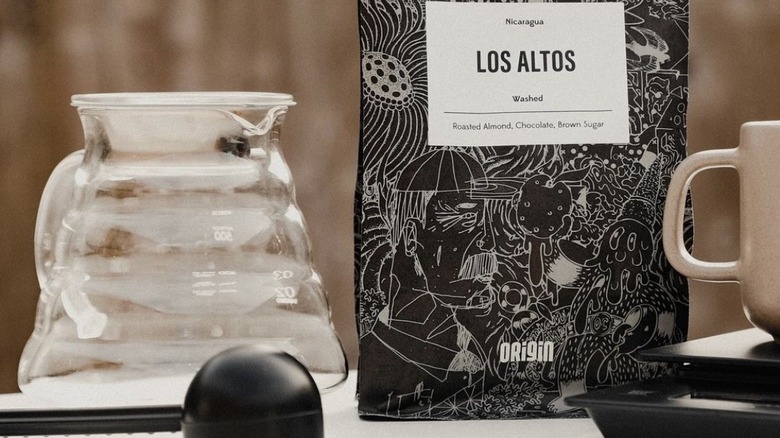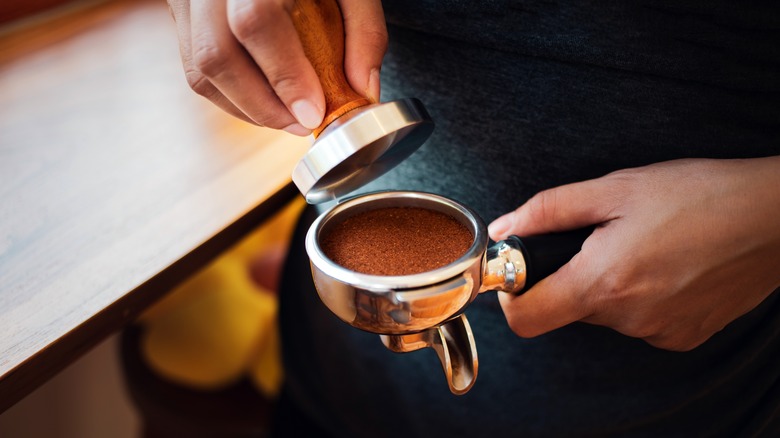Your Guide To Decoding Sustainable Coffee Labels
The definition of sustainability and how we as consumers define it has changed drastically over time. At one point, sustainability only referred to how ecologically-sound a product was — like in terms of limited damage to wildlife habitats and water footprint. The modernized definition of sustainability focuses more on equity issues in the supply chain, traceability to a single producer or origin, and transparency in the process by which the bean is sourced from the coffee plantation and travels to your local roaster.
The intersection of sustainability and consumer marketing is especially apparent with one product many people cannot live without — coffee. If you've purchased a bag of coffee recently, you've likely noticed the onslaught of labels printed on the bag touting "organic," "fair trade," and the like. How can you tell if companies are selling you a fake promise that your purchase makes a difference in coffee growers' lives? And how can you justify spending a couple of extra bucks on a bag of coffee, especially in a world where the world of labeling seems like a cryptic no-mans-land? Here's what some of the most popular coffee bean labels actually mean — and if the label even guarantees a more "sustainable" product.
Rainforest Alliance
Rainforest Alliance is one of the global certifying bodies for tropical products like chocolate and coffee.
The root of the Rainforest Alliance's certification program is very progressive. Companies that market with the Rainforest Alliance seal must pass rigorous accountability and sustainability standards focused on environmental, economic, and social well-being — called the "triple bottom line." In addition, the Rainforest Alliance certification programs use modern technology, like geospatial analysis programming, to help advance ecological conservation. The certification is also incentivized for producers rather than set up as a "pass or fail" certification to help companies reach sustainability goals tailored to their supply chains.
The alliance covers four major areas: forests and sustainability, climate, rural livelihoods, and human rights. Besides offering certification programs, the Rainforest Alliance program also provides long-term conservation programming and training in land management for producers. On the corporate end of things, the Rainforest Alliance focuses some of its work on supply chain management — meaning that they help companies set rigorous sustainability and traceability standards that define the practices and future of the respective industry.
USDA Organic
Organic food labels are notoriously difficult for consumers to interpret. A product with the USDA Certified Organic seal must have 95% of its ingredients sourced under the USDA standard, notes the USDA. In terms of coffee, this must mean that the coffee beans follow a rigid supply chain management process to prevent contact with non-organic food products, as well as several prescriptive approaches that limit exposure to synthetic pesticides, genetically modified organisms, and non-organic inputs like fertilizers.
Unlike other standards, the USDA Organic standard primarily focuses on the ecological components of sustainability rather than the ethical implications and connection to livelihoods. The USDA organic certification process is also expensive for producers to undergo; the process can take close to three years with several annual inspections, for which coffee farmers must pay the agents' accommodations for. As a result, many small, independent, and subsistence coffee farmers choose not to undergo USDA certification because they cannot afford the financial commitment, nor can they afford to lose yield with the certain pesticides and herbicides prohibited under organic guidelines.
Despite its misconstrued definition of "sustainable" coffee, the USDA organic seal is important to modern consumers. No evidence suggests organic coffee is healthier for consumers than conventionally-grown coffee. Some studies have indicated that most pesticides from conventionally-grown coffee are even burned off during roasting.
Fair Trade
Like the Rainforest Alliance, Fair Trade emphasizes the responsibilities of companies in improving livelihoods, empowering farmers, and protecting the environment. For a product to be Fair Trade certified, it must meet several criteria, including safe working conditions, environmental protections, commitment to dignified and sustainable livelihoods, and contributions to community development funds.
Some tangible criteria for a Fair Trade certification include a minimum price paid for farmers and workers and set environmental conditions with limits on certain synthetic pesticides and chemicals. As a consumer, you can rest assured that purchasing Fair Trade products means investing in good working conditions and economic well-being for producers in an industry where producers rarely make enough money from their coffee to sustain dignified livelihoods. A study of Costa Rican coffee growers revealed that communities where Fair Trade participation increased a single standard deviation resulted in a 3.5% increase in average income for households in the region, (via the National Bureau of Economic Research). This statistic indicates Fair Trade's importance in increasing coffee-growing communities' economic state — in addition to the economic well-being of growers themselves.
Shade-grown
If coffee is a tropical plant, wouldn't it love the sunshine? While coffee plants need some sun to grow, sun-grown coffee plantations can limit the biodiversity of the plantation and increase the need for synthetic fertilizers and herbicides. Instead, shade-grown coffee plants use a polyculture method — growing multiple species simultaneously within a set space — to boost diversity and maintain ecological balance. Shade-grown coffee only removes a few native plants and replaces them with coffee plants — which grow in the wild under the shade of other plants. While it might seem like this method decreases the yield of growing operations since fewer coffee plants are grown, shade-growing actually has numerous benefits for the farmer.
If you're looking for ecologically sustainable coffee, you should always choose shade-grown coffee. Sun-grown coffee promotes deforestation since farmers have to clear large swaths of land to grow the coffee plants. The exposure to dry land also opens up the opportunity for erosion and decreased habitat for wildlife like birds and small mammals.
Direct Trade
Direct Trade coffee is not considered a certification as much as it is an ideology. Products that undergo direct trading cut out the middleman for purchasing — meaning that companies buy directly from producers. This increases the amount of money that growers can get from their coffee and builds a relationship between the two entities. There is no certifying body for direct trade relationships between growers and producers, but many programs like Fair Trade have a similar purchasing model to direct trade.
Another one of the benefits of adopting a direct trade program is that purchasers can set standards for producers. For example, Counter Culture Coffee established a direct trade model in 2008 that sets a quality standard for all coffee it purchases. Other purchasers may require regular audits for how much herbicides and pesticides a grower uses, while others may require a certain percentage of forest cover for an operation. However, since these standards are not unified across a certifying body or an organization, it's difficult to say whether they are followed or adequate for long-term ecological sustainability.
Bird-friendly
The Smithsonian's Bird Friendly coffee certification is specifically focused on the habitat protection of birds; it was developed in the 1990s specifically for coffee production and has since expanded into cocoa. Currently, the bird-friendly certification program works with 5,100 farmers in 11 countries, equating to nearly 34 million pounds of coffee annually, (via the Smithsonian Institute).
The Bird Friendly certification requires a certain amount of foliage cover, tree height, and biodiversity to ensure the maintenance of proper habitat for wildlife. Since many of these standards overlap with the premise behind shade-grown coffee, many distributors advertise both on their coffee labels. In addition, bird-friendly operations must be organically certified to tout the official bird-friendly label on their products. This decreases pesticide exposure and helps achieve other environmental goals besides habitat-building and maintenance. As with other certifications, the Smithsonian's bird-friendly certification has some limitations; it focuses on the ecological aspect of sustainability rather than on producers' economic and social well-being.
B corps
B corps, short for "benefit corporations," are for-profit companies with a governance structure committed to economic, social, and environmental well-being. B Lab is the certifying body for B corps; the organization will review companies that have hit set environmental and social goals and assess their bylaws once those standards have been met.
The ecological standards assess the company's (and its supply chain and distribution channels') impact on air, climate, water, and biodiversity. There is also an emphasis on community impact — meaning that the company is assessed on its diversity, civic engagement, charitable giving, and supply chain management. Employee policies at B corps must achieve some level of worker financial security, career development, wellness, and job satisfaction, thus making this a more people-centric sustainability label than others.
The B corp certification is very holistic and requires a set score for a business to become certified. Therefore, there is flexibility in what sustainability looks like to a company based on this certification.
Ethically sourced
The term "ethically sourced" has few regulatory teeth. From a meta-perspective, ethically sourced would imply that a company is committed to fair wages for employees and suppliers, promotes a safe working environment, and qualifications of that nature. But, ethically sourced could also mean an ethical consideration for the environment and ecological systems. So, which is it?
There's no clear answer for what constitutes "ethically sourced" coffee because no standards or certifying bodies are involved. Like the word "natural" in food labeling, companies can use terms like ethically sourced to get consumers to buy a product (and sometimes, pay more for the product) without any vested qualifiers that make the product sustainable. If you're trying to purchase ethically or ecologically sourced coffee, you're better off buying a product with a reputable certifying body attached to it. That way, you can be sure that the premium you're paying for a coffee is actually worth paying for.
